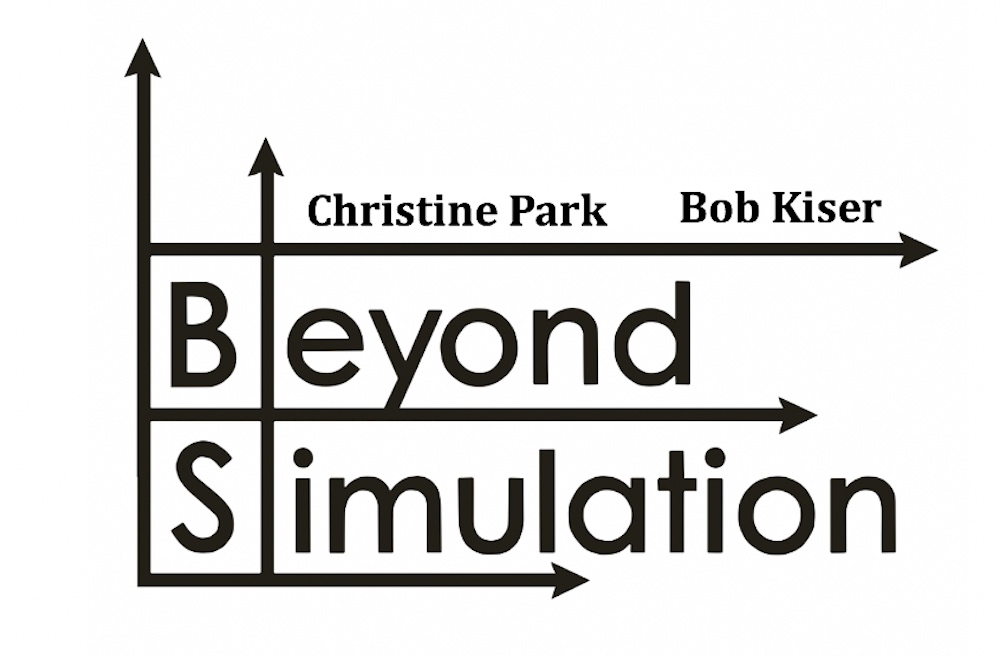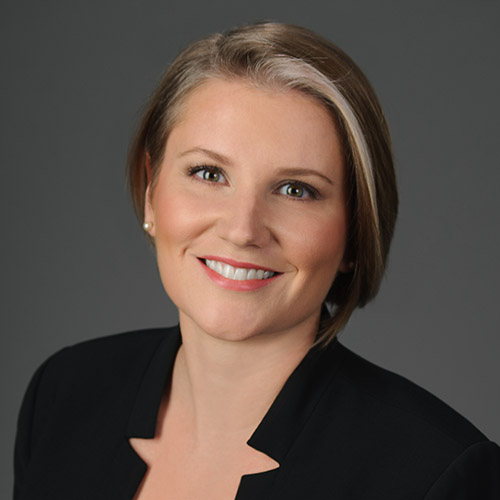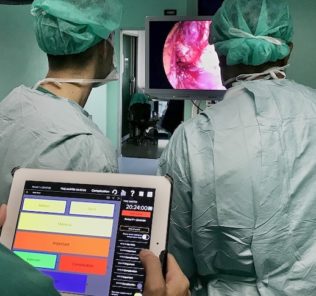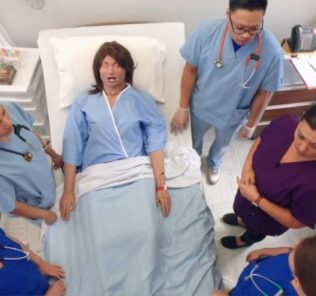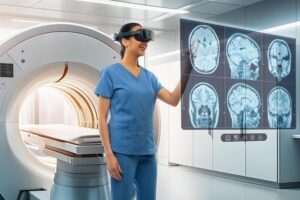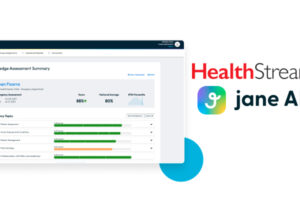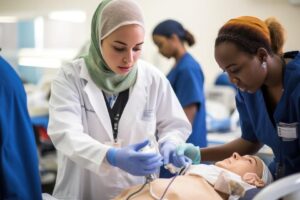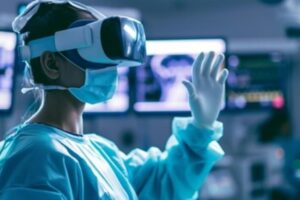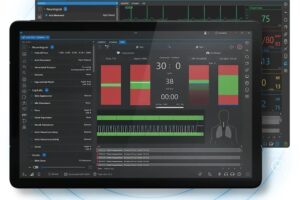Beyond Simulation Podcast: Healthcare Simulation Meets Human Interest
Healthcare simulation podcasts are a useful resource across healthcare simulation and benefit the clinical simulation community in a number of ways. One way is by sharing the knowledge and expertise of simulationists across the world. In this article, Michelle Castleberry, the co-founder of PCS, and presently responsible for all PCS Content and facilitates the Clinical Advisory Board, shares information about one clinical simulation podcast in particular: the “Beyond the Simulation” podcast. While sharing why this healthcare simulation is beneficial to clinical simulation listeners, she includes excerpts from the most recent medical simulation podcast episode.
If members of my social circle received $1 for every time I started a conversation with “I was listening to this podcast and…” they would easily be hundred-thousandaires! And I’m not alone in my podcast addiction. Last year podcasts reached the ears of 120 million Americans, and 383 million ears worldwide. Across healthcare simulation, we saw the number of podcasts increase by more than triple in the last two years! This HealthySimulation.com article specifically highlights the Beyond Simulation Podcast and shares how this clinical simulation podcast can benefit the greater medical simulation community.
Each healthcare simulation podcast offers listeners something a little bit different but generally stays within the same vein of professional development. However, the podcast, Beyond Simulation, is an outlier. This podcast from The University of Illinois Simulation and Integrative Learning Institute (SAIL) is wholly committed to those of us who are curious about and seek to better understand the simulationist beyond their credentials.
Sponsored Content:
We all recognize their names in academic literature, research articles, poster presentations, or as elected heads of our simulation societies, but we don’t know much about them as human beings. What’s not on their CV? If they weren’t in medical simulation, what would they be doing? This healthcare simulation creates the feeling of being invited to a small dinner party with two great conversationalists in past SSH president, Dr. Christine Park, and Associate Director of SAIL Bob Kiser, and their guests, all from the comfort of your AirPods.
In August 2022, the Beyond the Simulation podcast spoke with Gayle Gliva McConvey, one of the pioneers of Standardized Patient (SP) work who integrated SP methodology into clinical skills assessments and training for over 46 years. McConvey was a founding member of the Association of SP Educators (ASPE), the first recipient of the Educator of the Year award, and former association elected President. After two decades with McMaster Faculty of Health Sciences in Hamilton, Ontario, Canada, she was recruited to build and lead Eastern Virginia Medical School’s SP program.
After 24 years at EVMS, McConvey retired from her leadership role and began work on authoring and editing “Implementing Best Practices in Standardized Patient Methodology” which is part of the Comprehensive Healthcare Simulation series. Semi-retired, Gayle is now Director of Digital Patient Content with PCS (Patient Communication Simulators). Below is an excerpt of her Beyond Simulation episode:
Beyond Simulation: What keeps you tied to simulation? What is it inside you that says, “I have to keep doing this?” Because most people are like, ‘I’ve done that. I’m moving on to something else, but you’re still so active in our industry. What keeps you here?
Sponsored Content:
Gayle Gliva-McConvey: I think one of the really great things about our industry is that it’s always developing. It’s never stagnant. I’m sure both of you when thinking about a problem, you think ‘well, where can an SP fit into here?’ or ‘what can we do with our learners? What can we challenge them with?’ and I think that has always been the great thing about the methodology, it’s always changing…
I was telling Christine, that even now as a retired SP educator, I’m involved with avatars. And now I’m training avatars to be realistic enough that the interviewer, the student, is engaged in simulation. I’ve been able to see the way simulation has grown, when I first started it was McMaster and maybe a couple of other places in the world, and now look at it. I’m always in awe of this methodology. If you’re bored, shame on you (laughs).
A big fan of the podcast myself, I connected directly with Dr. Park and Kiser with a few questions of my own.
What are the goals of the podcast?
“We were chatting one day about how we wanted to create a space for behind-the-scenes conversations with simulationists, to shoot the breeze from things philosophical to silly, and, well, talk some BS. Et voila, ‘BS: Beyond Simulation’ was born. The goal of Beyond Simulation is to share the cultural and social fabric of our profession through the personal stories of individuals.”
Who should consider listening to it and why?
“With BS, we wanted to capture that feeling of having dinner with our simulationist friends after a long day at a conference, when we put down our professional selves to share with each other more of our human side: the joys and challenges, the moments big and small, that accompany us in our lives. So, if you’re seeking inspiration, human connection, and love anthropology, look no further than Beyond Simulation!”
Listen on Apple, Spotify, or wherever you get your podcasts!
More About PCS
PCS is a technology-focused simulation company founded in 2016 by a group of simulation veterans with the intent to push the boundaries of healthcare simulation by leveraging artificial intelligence and machine learning. PCS delivers best-in-class conversational AI to healthcare students across its product portfolio.
With PCS Spark, healthcare learners are able to engage with virtual simulated patients on-screen, or in virtual reality from practically any location on the globe. The PCS Speech Engine empowers PCS Spark digital patients to speak for themselves. PCS Spark digital patients can understand over 50,000 learner questions across 4,300 healthcare-related topics, and respond with scenario-specific responses.
PCS invites you firsthand to see what this conversational AI fuss is about. One of the PCS Spark cases is available for anyone to try with absolutely zero commitment through this link. Experience PCS Spark just as your students would by conducting a clinical interview and performing a physical with one of the available patients.
“We are extremely proud of the enhanced realism of more ‘well-rounded’ virtual patients as a result of our unique conversational and physiological AI models. PCS is all about elevating the most accessible simulation experiences to all future healthcare professionals,” shared Balazs Moldovanyi, CEO of PCS.
Listen to The Beyond the Simulation Podcast
Michelle Castleberry is co-founder of PCS, and presently responsible for all PCS Content and facilitates the Clinical Advisory Board. She is a healthcare simulation enthusiast with 20+ years experience within healthcare education technologies. Michelle resides in Northern Virginia with her husband and three children. She is a podcast fanatic, vintage travel poster collector, and progeny logistics expert.
Sponsored Content:



